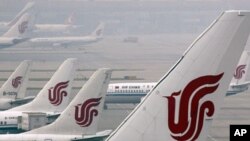China’s largest airlines could soon be prevented from flying to European airports after their trade agency said they wouldn’t pay a new EU emissions tax. On New Year’s Day, the 27- country bloc began levying a carbon tax on flights landing or taking off at their airports. Airlines or countries who don’t comply can be fined - or even banned from flying into the EU.
The European Union has long seen itself as leading the fight against global warming. And its emissions trading scheme - where companies have to pay a fee for the right to pollute - is the cornerstone of its policies.
Started seven years ago, the plan only targeted the utilities and heavy industry sectors. However, from the beginning of the year, all airlines that fly into or out of an EU airport have to pay - whether those airlines are registered in Europe or not. The amounts increase over the next few years.
The measure has faced stiff opposition from the U.S., India and elsewhere But now the agency, which represents the four main Chinese flag carriers, says it won’t pay the fees.
The association estimates the scheme will cost Chinese airlines $120 million in the first year and more than triple that by 2020.
Chinese Foreign ministry spokesman Hong Lei backed up the transport agency, saying it was concerned about what it called the EU’s “unilateral” move. It hinted it could form an alliance with other nations opposed to the plan.
"Many countries are against the European Union's actions," he said. "We hope that Europe can take a cautious and realistic attitude and act carefully and properly consult related parties including China to resolve this issue."
The penalties for non-compliance are severe. Fines of almost $130 for each ton of carbon dioxide emitted - and in the case of persistent offenders, the EU has the right to ban airlines from its airports.
Thursday in Brussels, the EU’s Climate spokesman Isaac Valero-Ladron said the Commission was happy to negotiate and talk to countries that had concerned - but maintained it stood by its new law.
"Our law breaches no principles of international law. And it does not breach the principle of sovereignty," said Valero-Ladron. "If they Chinese want to do business in Europe - like open a restaurant or something - they have to comply with health and safety requirements. This is not that different. If you want to operate in Europe, you have to respect the law."
There could be room for negotiation. Countries can choose to pay not directly into the scheme - but by "equivalent measures". Those could be other forms of carbon reduction, rather than the purchase of permits under the EU plan.
"It's a measure which a country feels most comfortable with" the EU spokesman said Thursday in conciliatory language. However, the EU introduced its policy after being frustrated by more than a decade of debate with no action at the United Nations. It will be extremely reluctant to back down. But China might soon find some allies. A draft law in the U.S. Congress proposes to make it illegal to comply.

